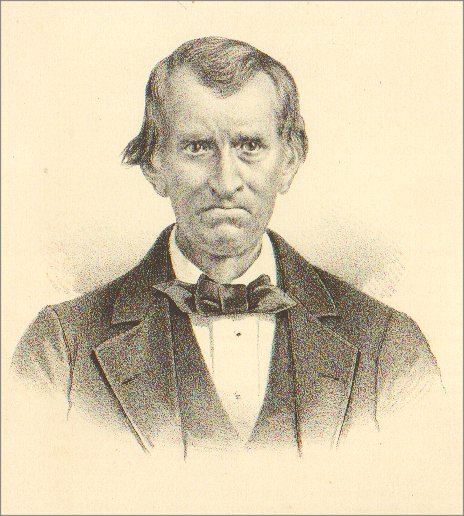
Bartholomew T. Wood

Bartholomew T. Wood
Bartholomew T. Wood, familiarly known to his friends and acquaintances as Bat Wood, was the first settler upon the site of Hopkinsville. Just when he came to Christian County no one knows; why he came, perhaps he did not know himself. It is related of his settlement, that when on his way to Kentucky, with no definite point in view, he was so favorably impressed with the abundance of game in this locality, that he stopped and built himself a cabin. He figured conspicuously in the early history of Hopkinsville and of Christian County, and at one time owned a vast amount of land around the embryo city.
He was a man of strong, practical common sense, but rather deficient on book learning; a rough diamond that marvelously adapted to the period in which he lived. In his buckskin hunting shirt and leather breeches, he hunted and trapped a great deal, and enjoyed himself as only a hunter could. He belonged to that sturdy class of pioneers whose iron frames had been hardened by exposure, whose muscles were toughened by exercise and toil, and whose bodies seemed invulnerable to disease and pain. The wilderness, with its wild beasts and savages, was their element. They sported with danger, and if need be met death with fortitude and composure. To such men, Kentucky in a measure owes her present glory and greatness.
Bartholomew Wood was a native of North Carolina and immigrated to Tennessee soon after the Revolutionary War. Some years later and prior to the close of the last century he came to Kentucky, but in what year is not known. (Other materials gives date as approximately 1796)
He was here when the county was organized, and donated five acres of land for public buildings. He entered a great deal of land in his own name and the names of his children. The following is told of his land speculations: He had entered a body of land in the name of one of his daughters, who afterward married Levi Cornelius. After her marriage Mr. Wood went to her to transfer the land back to him, but her husband would not allow her to do it. In spite of all arguments and importunities, Cornelius held to the land, and finally sold it to Young Ewing.
Mr. Wood, if not an energetic and wide-awake man in building towns, seems to have evinced a spirit of liberality quite commendable in that early day. He not only gave five acres of land and the timber for the first public buildings, but when the wants of the community required it, he gave a lot of ground for a cemetery and another lot for a baptist church. In his quiet, unassuming and unostentatious manner, he left his imprint upon many portions of the struggling town. Mr. Wood, from the traditions concerning him, seems to have thought a great deal more of hunting, fishing and trapping than of building up a town. He owned a great deal of land, however, and from the abundance of his acres did not hesitate to contribute of it to laudable and praiseworthy objects. We have no record of his religious inclination or beliefs, yet the fact remains without question that he gave the ground for the first Baptist Church.
Mr. Wood had a family of several sons and daughters. The names of his sons were Bartholomew, Hardin, Carter, William, and Curtis, the latter the only one now living. He is a man over 80 years of age, and is a resident of the county. One of his daughters married Levi Cornelius, as already stated; another married William Roberts, and one or two were still single when the old man moved back to Tennessee, which he did some years before his death. Most of his children went back with him, except Bartholomew, but after the death of their father they came back here and many descendants are living in the county today. Among them is the son Curtis, who is said to have been the first white child to be born within the limits of the present city, and Dr. Wood of Hopkinsville, a son of Bartholomew, Jr., and a grandson of the old pioneer.
The original cabin of Mr. Wood stood near the corner of the present Nashville and Virginia Streets. Where the latter street now is was then a marsh or lagoon for quite a distance back from the river. This lagoon was covered with innumerable ducks and wild geese and is said to have been one of the strong arguments which induced Bartholomew Wood to settle here, that he might enjoy the shooting of them, as well as other game to be seen everywhere in the most plentiful profusion.
Bartholomew Wood died in Tennessee 1827, but his remains are in the Old Pioneer Graveyard along with his wife, Mrs. Martha Wood, who died in 1847.
(Taken from "History of Christian County" , edited
by William H. Perrin, 1884)